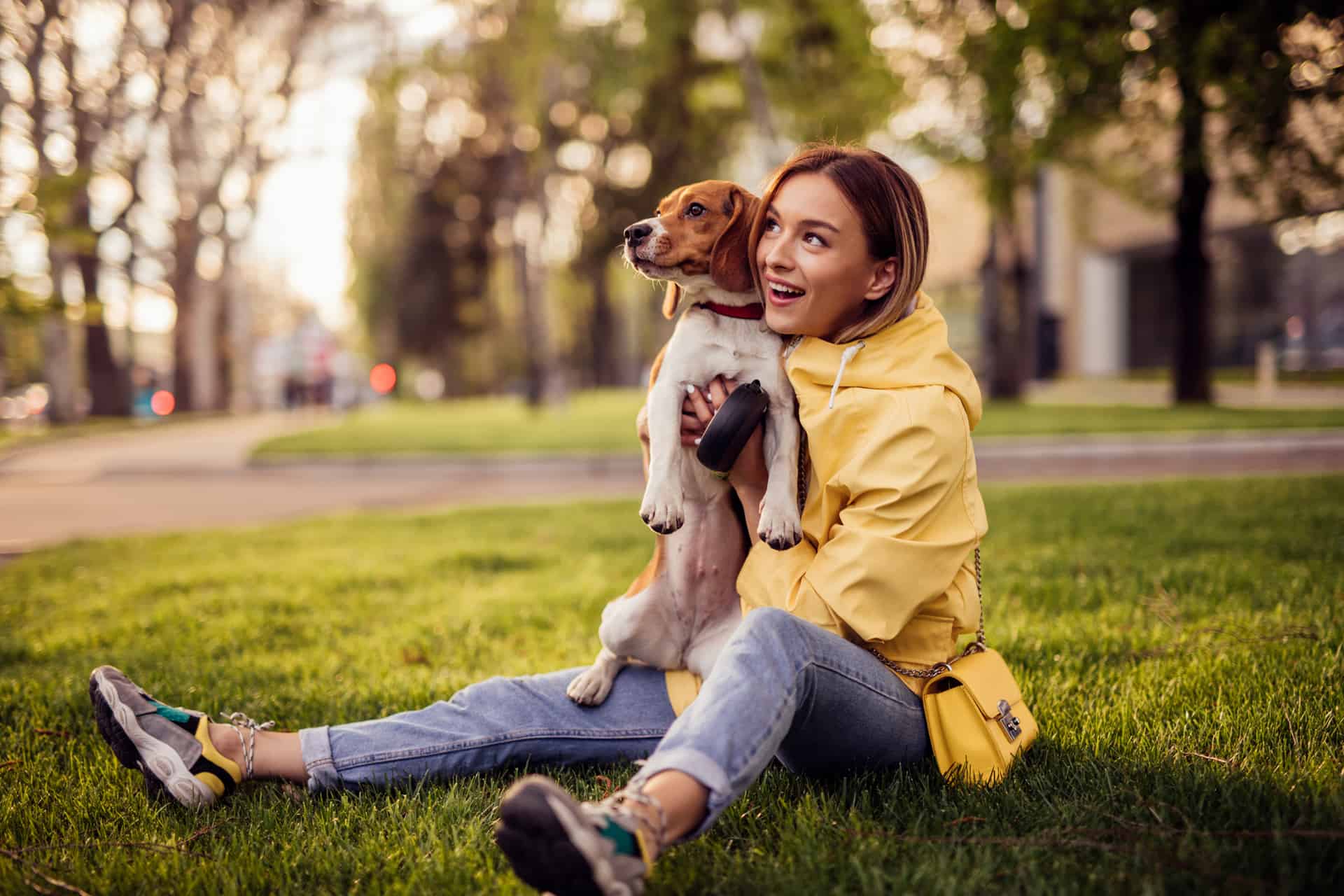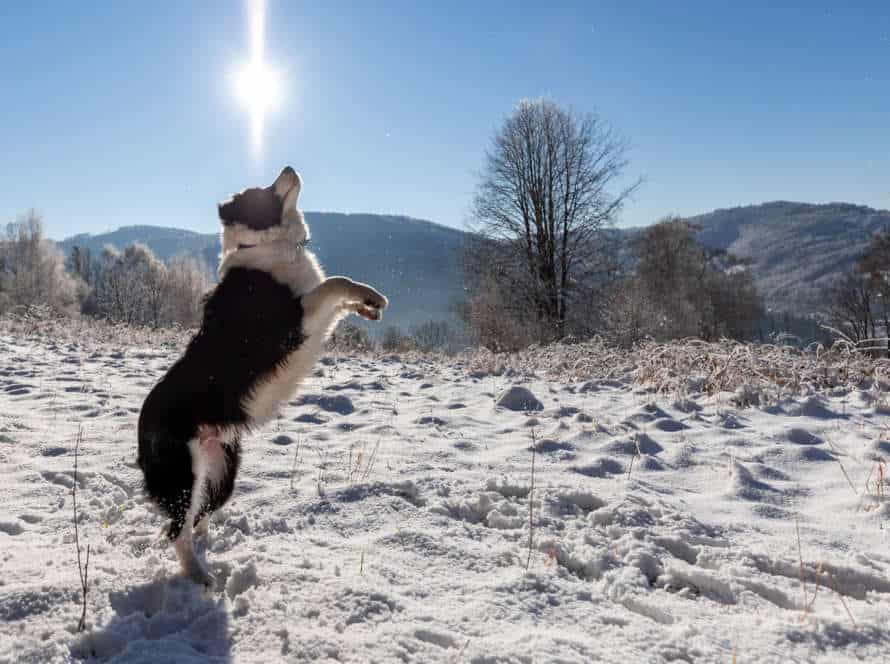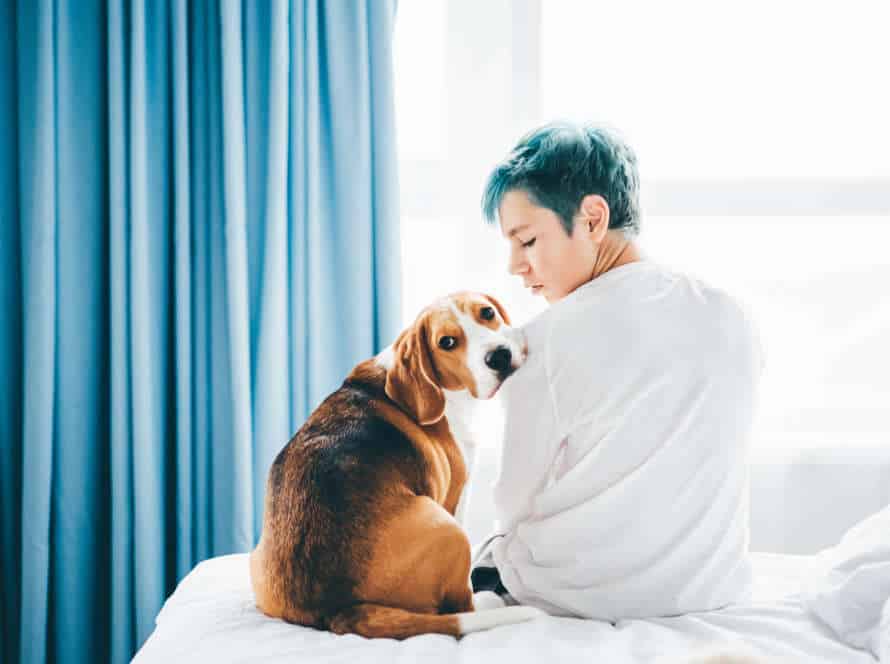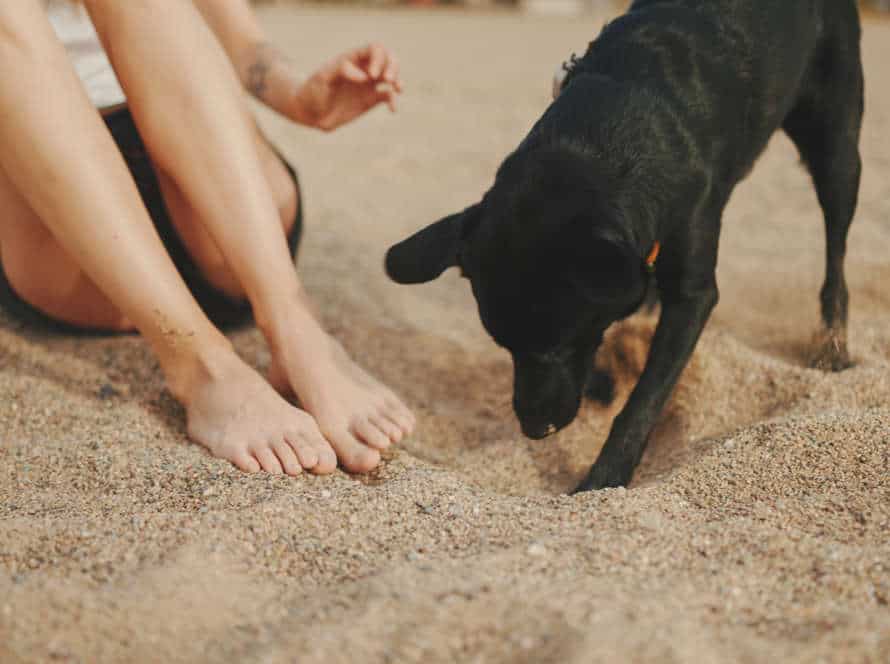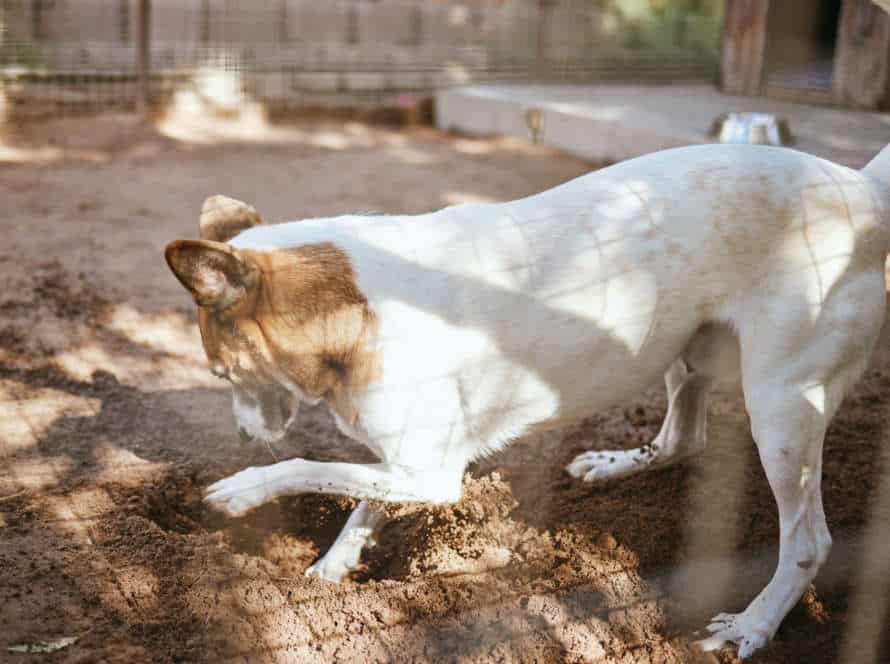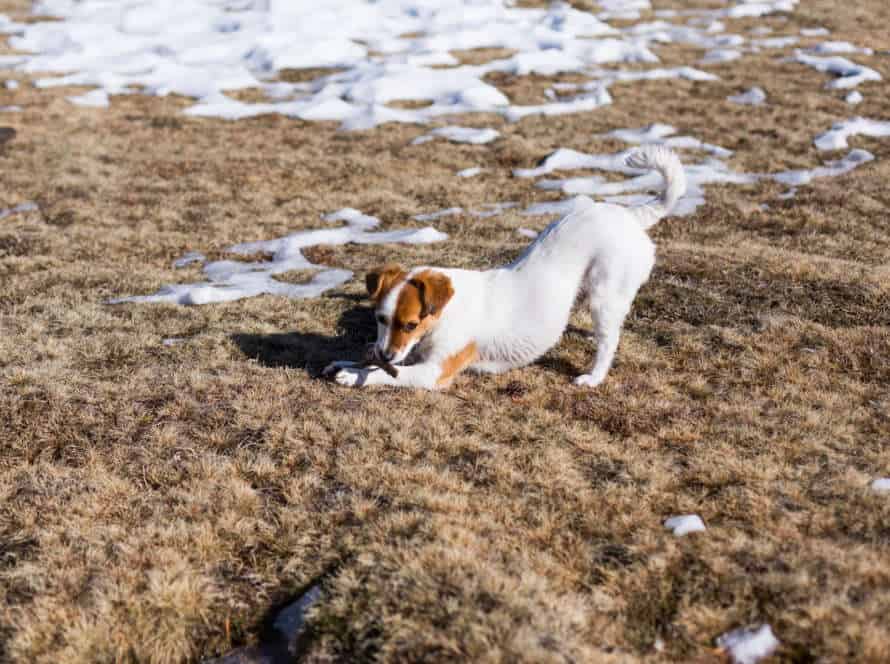Building a Strong Bond with Your Adult Dog to Discourage Digging
Want to stop or discourage your adult dog’s digging? Build a strong bond! This can be done by:
- Spending quality time with them every day – at least 30 mins to an hour. Play, go for a walk, or cuddle.
- Training them new tricks and commands. It boosts their confidence and they’ll love learning something new.
- Positive reinforcement. Use treats, praise, and affection when they behave in a way you like.
- Consistency. Make sure you spend time with them, train them, and reward them for good behaviour.
- Physical contact. Touch and cuddle your pup often to strengthen your bond.
These bonding exercises will help you build a better relationship with your pup, reduce boredom, and discourage digging.
Understanding Your Dog’s Behavior
Understand why your furry friend is digging. It will help you prevent it. To combat boredom, which can lead to digging, build a strong bond with your adult pup. Here are some tips to help create a strong connection between the two of you:
Why Dogs Dig
Dogs dig for diverse reasons. Knowing why they do this is key to having a strong connection with your grown-up dog and prevent them from digging.
Common causes may be boredom, anxiety, instinct or trying to cool down and regulate body temperature.
To stop the digging, give them enough physical and mental activity, lots of toys and chewable items. Also, make sure they have a snug and secure place to relax in.
Remember to always praise your pup when they do something good and don’t use harsh punishments as they can create fear and anxiety and lead to more digging.
By understanding why they dig and having a positive bond with your pup, they will be a content and happy member of the family. Tip: Make a dedicated digging space for your dog and redirect the digging there.
Identifying the Pattern of Digging Behavior
Digging is normal for dogs, but too much of it can signal a problem. To understand why your dog is doing this, first identify the pattern of their digging.
Observe them and try to spot triggers – like boredom, anxiety, or burying a toy. Look at where and how deep the holes are. Is your pup digging in just one area or all over the yard? Check for signs of other behaviors, like chewing or destruction.
Once you have the pattern figured out, address the underlying cause and work to build a stronger bond with your pup to stop the digging.
Establishing Rules
Rules are key for stopping adult dogs from digging. Here are a few to remember:
- No digging inside the house. Praise and reward your dog for not digging indoors.
- Have a specific area in the yard for digging. Put toys or treats there to encourage them to dig there.
- Watch them when they’re outside, and direct them to their designated digging area if they dig somewhere else.
- Make sure your dog’s getting enough exercise and mental stimulation. A content dog is less likely to do destructive things like digging.
It’s important to be consistent with the rules you set. This is how you create a strong bond with your pup and a happy home for both of you.
Building a Strong Relationship with Your Dog
Dogs are loyal and need attention. Creating a strong bond with your dog is essential. This bond will stop them from digging. Spend time with your dog often to build the bond. The more time you spend together, the less they’ll look elsewhere for attention. Let’s find out how to make this bond.
Spending Quality Time Together
Quality time together is essential for a good connection with your adult dog. To strengthen the bond and avoid destructive behaviors, like digging, here are some tips:
- Play regularly: Plan daily activities your dog likes, such as fetch or tug-of-war. Give them all your focus.
- Train: Frequent training helps build trust and respect. Plus, it’s mentally stimulating.
- Go for walks: Use this time to bond. Talk, give praise and affection, and explore new places.
By creating a strong bond, you can discourage digging and have a happy, healthy relationship with your pet.
Positive Reinforcement Training
Positive reinforcement training is a powerful tool to build a strong bond with your dog and discourage digging. Here are some tips for using it:
- Offer treats and praise when your pup does something good, like obeying commands or playing with appropriate toys.
- Spend quality time with your pooch, like taking them for walks or playing together.
- Redirect attention away from digging by giving alternative activities, like playing with a toy or having a training session.
- Be consistent and don’t use punishment-based techniques; they can hurt the relationship.
Pro tip: Positive reinforcement training can help address various behavioural issues and is a fun and rewarding way to bond with your furry pal.
Incorporating Exercise and Playtime into Your Daily Routine
Building a strong bond with your pup and preventing digging? Incorporate playtime and exercise into your daily routine! Here’s how:
- Set aside 30 minutes every day to play and engage your pup in stimulating activities. Introduce new toys, and rotate them regularly. Use positive reinforcement techniques to reward good behavior.
- Take your pup on walks for exercise, fresh air and stimulation. They’ll be less likely to dig out of boredom or frustration.
- Enroll them in obedience classes or agility classes for new challenges and bonding opportunities.
- Don’t forget to love and show affection to your pup daily – a happy and healthy pup is a well-behaved pup!
Distracting Your Dog from Digging
Adult dogs who dig? Build a bond! Provide positive reinforcement, exercise and activities. This way, you can shape their behaviour and reduce digging in the garden. How to distract them? Let’s discuss!
Providing Ample Toys and Chews
Give your dog plenty of toys and chews! This can help prevent them from digging and create a strong bond. If dogs have too much energy, they might dig or chew things. Toys and chews can help redirect their energy in a positive way.
Here’s how to pick the right ones:
- Look for ones that are tough and made of safe materials.
- Get toys that promote mental stimulation, like puzzle toys or treat-dispensing ones.
- Change the toys every few days to keep your pup interested.
- Play with them to build a bond and get exercise.
By providing your adult dog with plenty of toys and chews and playing with them, you can help prevent digging and destructive behaviour.
Creating a Digging Pit
If your pup is digging your yard, a digging pit can be useful. It’ll encourage your dog to dig in the designated area, not your garden or lawn! Here are the steps:
- Choose a spot that you don’t mind them digging in.
- Make it more inviting by burying toys, treats, or bones.
- Lead your pup to the area, and reward them with praise and treats when they dig in the spot.
- Finally, spend quality time with your dog. Doing activities like playing fetch or going for walks can help your bond, and discourage them from digging due to boredom or anxiety.
Using Scents to Distract Your Dog
Distract your pup from digging with scents! Citrus, like lemon or orange, is usually unpleasant to dogs so try candles or peels around the digging spot. Mint has a calming effect and can keep them occupied with sniffing and licking. Lavender also works to create a calming environment.
Additionally, bonding with your adult dog through positive reinforcement is key. Spend time with them, praise them, and get physical activity! Lastly, always supervise your pup when they are outside and redirect their attention if they start to dig.
Addressing Underlying Issues
Digging can be caused by boredom, anxiety, or lack of exercise. To address the problem, it is vital to know what caused it. If the reason is lack of stimulation, provide your pup with toys or introduce her to dog sports. Anxiety-related digging needs a strong bond between you two. We will talk about how to build such a bond with an adult dog.
Separation Anxiety
Separation anxiety in dogs may lead to bad habits like digging, chewing, or scratching. To prevent this, owners should build a strong bond with their pup. Here are some tips:
- Play, train, and walk with your dog everyday.
- Use positive reinforcement for good behavior.
- Create a safe place for your dog when they’re feeling anxious.
- Gradually increase time spent apart, rewarding positive behavior.
By strengthening the bond with your pooch, you can help ease their stress and stop destructive behaviors while you’re away. Plus, it’s a smart idea to ask a vet or animal behaviorist for more help with separation anxiety.
Boredom and Lack of Stimulation
Digging may be caused by boredom and lack of stimulation in adult dogs. Build a strong bond with your pup to prevent this behavior!
How? Spend quality time with them daily – playing and training. Stimulate their minds with puzzles, hide and seek and other games. Exercise them with daily walks or runs. Reward good behavior with treats, praise and love. Consider enrolling them in obedience classes or hire a pro trainer for structured stimulation. This will result in a happier and healthier relationship with your furry friend!
Health Problems and Discomfort
Digging in adult dogs may be caused by health problems and discomfort. It is important to treat any physical issues before trying to stop the digging.
Possible health issues that lead to digging include:
- Fleas and mites. These parasites may cause itching and pain. Treat your dog with a flea and tick medication or take them to the vet.
- Joint pain. Arthritis and other joint issues may make it hard for your dog to move. Give your dog joint supplements or meds to help.
- Anxiety. Dogs may dig to reduce anxiety. Use positive reinforcement training or get help from a pro dog trainer.
Once physical and mental health issues are treated, build a bond with your dog and provide exercise and stimulation. This can help stop the digging.
Seeking Professional Help
If basic training and exercise don’t help your pup’s digging, it’s time to call a pro. A professional dog trainer can pinpoint the cause of the behavior and give you techniques to change it. With their expertise, you and your pup can build a strong bond and learn to meet expectations.
Behavioral Specialists and Trainers
Having trouble with your adult dog’s digging? Get help from an expert! A behavioral specialist can work out why your pup is digging, then craft a plan to stop it. A trainer can also help strengthen the bond and teach better alternatives.
Here’s how to get started:
- Research certified specialists or trainers nearby.
- Set up a consultation to explain your worries and ambitions.
- Act on the specialist/trainer’s advice.
- Be patient & consistent in training, and reward good behavior.
Veterinary Assistance for Health Issues
Veterinary Help for Health Issues in Animals
Veterinary help is essential to spot and cure health issues in animals, similar to humans. Consulting a vet can help determine the source of your pet’s health problems and keep its health and joy secure.
Vets have the knowledge, experience, and skill to recognize and manage several health-related issues, from small ones such as ear infections to worse conditions like heart disease or cancer.
Apart from specialist help, having a good relationship with your grown-up dog can also stop unwelcome behaviors like digging. Investing time with your dog, giving it enough activity, and teaching it using positive reinforcement techniques can form a strong bond, leading to superior behavior and improved health.
Pro tip: Visiting the veterinarian frequently, alongside a balanced diet, exercise program, and a great relationship with your pet, can go far in making sure your dog’s health and joy.
Finding Supportive Community and Resources
It is important to find a supportive community and resources when tackling professional help and building a strong bond with your adult dog to stop digging. Here are some tips:
- Search local dog training centers or clubs near you. They often have support groups, obedience classes, and more to help train and bond with your pup.
- Join online forums or social media groups specialized in dog training and behaviour. You can find a lot of help and encouragement from other dog parents and trainers.
- Talk with a qualified dog trainer or behaviorist. They can give tailored advice and support to sort out particular behavior problems, including digging.
- Apart from seeking help, having a solid bond with your dog is a must. Spend quality time with them daily, take part in play and training, and offer them ample exercise and mental stimulation. A dog that has had enough physical and mental exercise is less likely to do destructive things like digging.
Bonus: Don’t be scared to ask for help or support when it comes to your dog’s behavior. There are many resources available to aid you and your furry pal to have a happy and healthy life together.
Frequently Asked Questions
Q: Why does my adult dog dig in the yard?
A: There are many reasons why dogs may dig, including boredom, anxiety, seeking attention, hunting instincts, or trying to escape. It’s best to identify the underlying reason before attempting to discourage digging behaviors.
Q: How can I build a stronger bond with my adult dog?
A: Spending quality time with your dog, regularly engaging in positive reinforcement training, and providing plenty of exercise and mental stimulation can all help strengthen the bond between you and your dog.
Q: What are some tips for discouraging digging behavior in adult dogs?
A: Providing your dog with appropriate digging areas, giving them plenty of exercise and mental stimulation, and praising them when they avoid inappropriate digging behaviors are all effective methods for discouraging digging.
Q: Can punishing my dog for digging or other unwanted behaviors be effective?
A: Punishing your dog for unwanted behaviors can do more harm than good, as it can strain the bond between you and your dog and lead to further behavior problems. Positive reinforcement training is a more effective and humane approach.
Q: How can I provide my adult dog with mental stimulation?
A: Engaging in regular training sessions, providing puzzle toys and games, and exploring new environments and experiences can all provide mental stimulation for your adult dog.
Q: Are there any dog breeds that are more prone to digging behavior?
A: Some breeds, such as terriers, were historically bred for digging and may be more prone to digging behavior. However, any dog can dig if they are bored, anxious, or attempting to escape.

